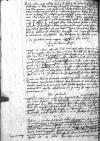List #3913
Ioannes [DANTISCUS] do UNKNOWNHeilsberg (Lidzbark Warmiński), 1545-04-09
Rękopiśmienne podstawy źródłowe:
| ||||
Tekst + aparat krytyczny + komentarzZwykły tekstTekst + komentarzTekst + aparat krytyczny
Ioannes
Nobilis et erudite fidelis dilecte.
Eo quod
